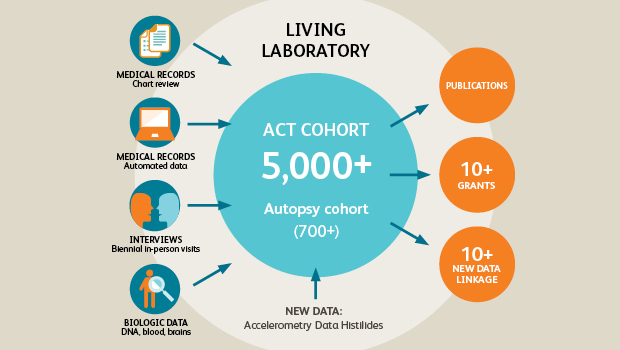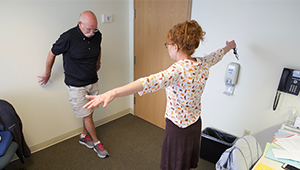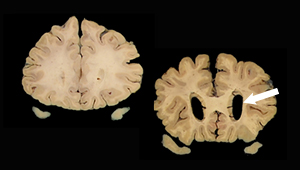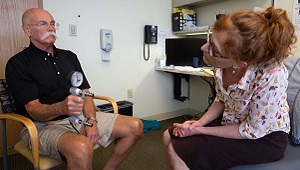ACT study: Long-running study of aging examines changes in Kaiser Permanente patients over time

Drs. Larson and Crane co-lead Kaiser Permanente-University of Washington collaboration learning how to promote healthy aging
Update: In May 2021, the National Institute of Aging awarded the ACT study a new 5-year grant totaling $55.6 million — 3 times the amount of the study’s previous funding round. To learn more, see New NIA grant of over $55M to boost ambitious Alzheimer’s, dementia study.
Every two years, 2,000 older Kaiser Permanente patients check in with the Adult Changes in Thought (ACT) study. The joint project between Kaiser Permanente Washington Health Research Institute (KPWHRI) and the University of Washington (UW) focuses on finding ways to delay or prevent dementia, including Alzheimer's disease, and declines in memory and thinking. It aims to deepen understanding of how the body, especially the brain, ages—and discover how people can age in the healthiest possible ways.
"Thanks to our dedicated patients and their families—and our team of leading-edge scientists and staff at the UW and Kaiser Permanente—the ACT study is a 'living laboratory' of aging," said co-principal investigator and founder of the study, Eric B. Larson, MD, MPH, a senior investigator a KPWHRI.
The study, which has been continuously operated since its start in 1986, is the longest-running study of its kind. It began as the Alzheimer’s Disease Patient Registry, conceived like a registry of cancer patients. Now it includes one of the largest populations of extremely old (> 85-year-old) people with collected information going forward (prospectively). The National Institute on Aging recently funded it for another five years, focusing mostly on these three areas:
- How can having various conditions affect brain aging? These conditions include risk factors that can be modified for diseases of the heart and blood vessels.
- What factors might explain resilience to age-related change? "We've learned about what our research subjects value as they age,” Dr. Larson said. “We hope to help them find the best solutions to age well—promoting their independence and providing them with skills to cope with any problems that may happen."
- How can the ACT study continue to serve as a resource for a variety of research on older people and aging, accommodating collaborators around the world interested in ACT’s rich sources of information?
The participants have been patients at Kaiser Permanente for on average at least 30 years before joining the study. "That gives us a wealth of medical, drug, and lifestyle information to help answer our research questions," said the other co-principal investigator, Paul K. Crane, MD, MPH, a UW School of Medicine professor of medicine and KPWHRI affiliate investigator. "ACT is the world's only study that can link outcomes for dementia, frailty, and aging to data that captures each participant's whole health history, including medical, laboratory, and pharmacy records."
Like the celebrated Framingham Heart Study, ACT is a longitudinal study of a “cohort” of people leading their lives in a community. That means it follows a large group of people at regular intervals over a long time to see what happens to them. As with Framingham, insights from the study group have helped other people to stay healthier.
At each bi-annual study visit, ACT study participants are observed as they walk and do many other physical and mental tasks. Their DNA is collected and stored at the UW and in a national repository of samples from Alzheimer’s disease studies. Participants are asked many questions, including whether they would allow an autopsy on their brains after they die. ACT now has one of the world’s largest brain banks: nearly 600 brains, likely to increase to 800 within the next five years. ACT is the only truly population-based study involving autopsy and study of diseases of the brain, or neuropathology, work led by Associate Professor C. Dirk Keene, MD, PhD, head of the neuropathology service at the UW.
The ACT study has learned many lessons to date, published in more than 325 scientific articles. Several discoveries have led to changes in how people with dementia are cared for and helped ease the burdens these illnesses can cause. Some highlights are listed below:
The study may be best known for findings about the benefits of physical activity but has gained attention for many other contributions
Physical activity
- Regular exercise is linked to reduced risk of dementia, Alzheimer's disease, and declines in how well people think.
- The first apparent signs of dementia—including Alzheimer's disease—in older people may be changes in physical function, which often precede noticeable mental decline.
Medication safety
- Use of larger amounts of common medications that have strong anticholinergic side effects is linked to higher risks for developing dementia, including Alzheimer’s disease.
- Certain drugs, especially sedatives, can cause confusion and falling.
- On the other hand, statin drugs, used to treat high cholesterol, may be linked to fewer of the microscopic brain changes that are typical of Alzheimer's disease.
Nutrition
- Risk for dementia is tied to blood sugar levels, even without diabetes.
- Anti-oxidant supplements (vitamins A and C) and some common pain relievers (non-steroidal anti-inflammatory drugs, or NSAIDs) seem not to prevent brain decline.
- Avoiding environmental toxins throughout life can help delay the brain's decline.
Blood vessels
- Microscopic injuries to blood vessels in the brain, called cerebral "microinfarcts," which cause "small-vessel disease of the brain," can lead to many brain problems in late life.
- These microinfarcts may be responsible for more cases of dementia than previously recognized, often combined with pathologic changes of Alzheimer's.
- Controlling high blood pressure may lower the risk of dementia by minimizing microinfarcts.
Genetics and brain science
- The national Electronic Medical Records and Genomics (eMERGE) network is showing how best to combine information from genetics and electronic health records—and has identified numerous linkages of genetic changes with common diseases and is also looking at genetic changes that predict good and bad responses to commonly used drugs.
- ACT is the single largest study in the Alzheimer’s Disease Sequencing Project (ADSP), which is sequencing people’s whole exomes (the ~3 percent of the genome that gives instructions for all the body’s proteins) to search for small variations that are more common in people with Alzheimer’s disease than in those without it.
- The Alzheimer’s Disease Genetics Consortium (ADGC) has found some new genes involved in Alzheimer’s disease—and how the genetics of the disease differs in African Americans versus whites. “We’re really proud that all of our efforts to enroll a population that reflects the diversity of the Seattle area paid off in contributing to this important work,” Dr. Crane said.
- And in the largest-ever study of Alzheimer’s disease, the International Genetics of Alzheimer’s Project (IGAP) helped identify new genes involved in late-onset Alzheimer’s disease.
- The brain may still be affected long after a head injury has happened.
- With the Allen Institute for Brain Science, ACT is helping to investigate lasting effects of traumatic brain injuries (TBI).
More practical findings:
- Walking barefoot or in stocking feet can lead to falls and injury. Wear shoes or slippers with non-skid soles, even at home.
- Wandering, agitation, and disturbed sleep complicate the lives of patients with Alzheimer's and their families.
More than 5,000 people have participated in the ACT study. To be invited to enroll, people must be free from cognitive impairment (problems with memory and thinking). Over time, some develop dementia, including Alzheimer’s disease, and some die—and around 240 new participants are enrolled each year to keep the study group size steady at about 2,000 people. People are invited to participate after being randomly selected from a census of all Kaiser Permanente members who are age 65 and enrolled in central King County primary care sites. ACT enrollment is by invitation only. People can independently volunteer to participate in many other Kaiser Permanente research projects, but because of the ACT study’s design, random samples are necessary to identify people who are invited to consider joining it.
by Rebecca Hughes
New funding

Grant of over $55M to boost Alzheimer’s, dementia study
Kaiser Permanente Washington will co-lead an expanded ACT Program to better understand the aging brain.
Research

Study evaluates biomarker criteria for Alzheimer’s risk
One-third of people classified as ‘highest risk’ may not develop Alzheimer’s disease, study suggests
healthy findings blog

Preventing dementia: Effects of hypertension drugs
ACT studies find medications to treat high blood pressure may differ in their impact on dementia risk, writes Dr. Eric B. Larson.
aging and geriatrics

The ACT Study: Looking toward the future
At 25 years, the Adult Changes in Thought Study is committed to science, collaboration, and jokes, writes Erin Bowles


